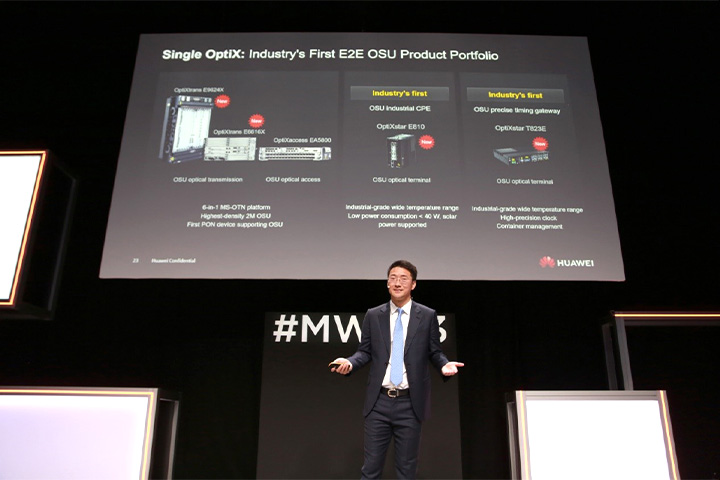Produkty, Rozwiązania i usługi dla przedsiębiorstw
[Barcelona, Spain, February 28, 2023] During the Mobile World Congress (MWC) 2023, Huawei launched the industry's first End-to-End Optical Service Unit (OSU) product portfolio running on the fifth-generation fixed network (F5G). The product portfolio builds a reliable optical communication base for industries such as energy and transportation.

Industries such as energy and transportation are crucial to economic growth and quality of life. As a basic component of the production system, the communication network needs to be secure and reliable to support these industries. Industry digitalization is deepening, and we will need production communication networks with higher bandwidth to support emerging services such as automated inspection of power lines, smart power distribution, intelligent highway monitoring, and intelligent toll stations.
Vincent Liu, President of Huawei's Global Enterprise Network Marketing & Solutions Sales Dept, said, "By using Optical Service Unit (OSU) — the fifth-generation Native Hard Pipe (NHP) technology, Huawei has developed an End-to-End NHP network solution and launched an End-to-End OSU product portfolio from backbone networks to access networks. This solution provides a secure and reliable optical communication base for production management services, real-time control services, and integrated data services."
Huawei's End-to-End OSU product portfolio includes fully upgraded optical transport devices of the OptiXtrans E9600/E6600 series, optical access devices of the OptiXaccess EA5800 series, the newly launched industrial CPE device OptiXstar E810, and the intelligent timing IoT gateway OptiXstar T823E-T. These products enable End-to-End OSU native hard pipes from the backbone layer to the access layer, as well as unified OSU deployment and management across the entire network.
Huawei End-to-End NHP network solution has the following features:
• Ensuring production security using End-to-End native hard pipes: Time division multiplexing (TDM) technology provides isolation of services by using OSU native hard pipes from the backbone layer to the access layer, with zero interference and zero blocking between services. This ensures production services are secure and reliable.
• Providing future-oriented ultra-high bandwidth: Mainstream Synchronous Digital Hierarchy (SDH) technology on the live network supports up to 10 Gbit/s bandwidth, while OSU can provide bandwidth of up to 800 Gbit/s per wavelength and 96 Tbit/s per fiber to accelerate digital and intelligent services.
• Inheriting traditional services with forward compatibility: Huawei's 6-in-1 optical transport platform is fully compatible with Pulse code modulation (PCM), Plesiochronous digital hierarchy (PDH), and SDH services on the live network. This compatibility enables sustainable development of existing service systems and reduces investment costs.
• Simplifying backbone O&M by unified management: OSU services improve O&M efficiency by 50%. They support one-click service provisioning, one-click fault locating, and network-wide service visualization and management from backbone networks to access networks.
Huawei's NHP solution has won wide acclaim in the energy and transportation industries. It has been deployed by customers in more than 80 countries and regions around the world to help build a reliable optical communication base for industries.For more information about Huawei's NHP solution, visit https://e.huawei.com/en/solutions/enterprise-optical-network/industry-optical-transport-network.